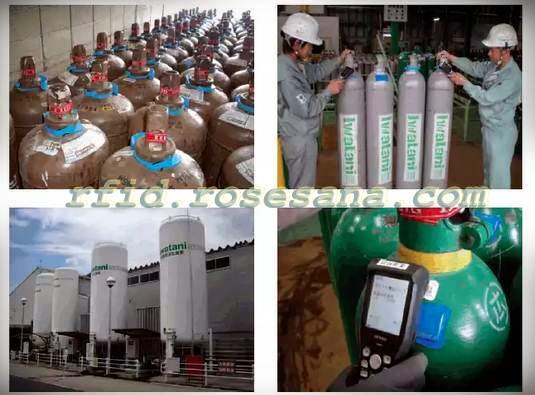RFID Technology innovation Management for Industrial Gas Cylinder
Industrial gas companies use metal cylinders as the primary business and deliver gases to supply their customers . The company makes the cylinder huge investment - a key recoverable assets.
Track these cylinders are very important because asset utilization and visibility in these difficult economic times is very significant. Business productivity , knowing what the cylinder , they are at any given time and the state of their work, and generates state all directly affect the bottom line of key elements.
Insiders know , reading, writing and data into the cylinder takes a lot of time workers . On top of this , during the reception process , filling, transportation and track repeatedly . In addition, about 10% of manual entry is incorrect . In a business that depends on the exact track of each cylinder , errors may result in the loss of the cylinder becomes faster ; productivity and performance on the bottom line of huge losses had a negative impact .
Barcode and related tracking technology has been in use for some time . Barcode is handicapped because it has been deemed to have been read. In harsh industrial environments, the barcode becomes unreadable due soon or cutting the soil cover or oil . The greatest challenge to the use of the bar code , the bar code can be easily copied , so that the physical location of the integrity of the cylinder unreliable .
Ultimately, this lack of assets and can not easily be found lacking when the relevant assets are most in need
of information of the latest results of its operating status data readily available .
RFID ( radio frequency identification ) technology , through a unique chip components , it is small , has no moving parts to replace it overcomes obstacles barcode. Digital microchip embedded a unique identifier , so that the label is extremely unique , no one can fake readings assets associated with it . Since the RFID tag does not need a direct line of sight which is embedded in the case of impact resistance to withstand a high protection in industrial conditions is difficult and extreme environments. Mud and oil does not interfere with reading .
RFID tags have many years of life. RFID technology uses a RFID reader ( start signal and a radio receiver) passive RFID tag (with metal noise resistant) hear back signal. When pulling the trigger in RFID reader , the tag is read and provides a unique identification code. This makes it possible to track assets.
Issues faced by industrial gas companies
- Underutilization of cylinders due to the inefficient and inaccurate tracking methods in use today.
- Difficult to differentiate between customer-owned, dealer-owned and company-owned cylinders.
- Difficult to determine which cylinders are due for scheduled maintenance and testing.
- The damage/pilferage of a cylinder cannot be identified and attributed to a specific customer or delivery.
- Effort in identifying cylinders increases the time of operation and lost productivity.
- Cylinder audit or census is extremely difficult as companies have to dig up records to locate the company-owned cylinders.
- Reconciling discrepancies in customer's and company's cylinder holding records.
- The accounting procedure in the present system is time consuming since the dispatch and warehouse officers have to upload the record of each customer manually after deliveries. This may also result in errors that are difficult to track.
- The present system doesn’t offer a fool-proof check for preventing the wrong gas to be filled in the cylinder. This is a major safety issue.
- Cylinders which are condemned, or identified as lost or stolen are not reported in the system which leads to inaccuracy in records.
Benefits of RFID in Cylinder Tracking
- Real time visibility of stocks & location of cylinders.
- Accurate information with less effort & lower labor costs.
- Cylinders can be tracked on the dock, at a customer site, at fill plants, at testing facilities, or at other distributors.
- Warehouse cylinder stocks can be counted in a fraction of seconds.
- Time to time maintenance of cylinders improve efficiency & avoid unplanned maintenance which increases revenues by reducing the turnaround time.
- Complete history of the cylinders that helps to identify the cylinders age which are due for test & assures the complete safety to the workers & customers.
- Simplify the process of delivery process by saving time, reducing errors and enhances the customer satisfaction.
- Decrease in lost cylinders or cylinders credited to the wrong account. Greater efficiency in inventory used and ordered.
- Able to prevent pilferage/theft of cylinders.
- Updating the cylinder details like shipment, cylinder return into the system eliminates any possible error.
Conclusion
Advanced Cylinder Tracking System provides excellent process control, cylinder --
management automated tracking with less errors thereby increasing efficiency in the
overall functioning of the system. RFID implementation provides improved asset
visibility to the gas suppliers and manufacturers and hence can be used to make
decisions on the supply. The benefits of an RFID implementation to the gas cylinder
industry are measurable. Automation of the process improves overall accuracy, allows an
efficient use of assets, enables a faster turnaround of inventory, increases employee and
customer safety, reduces cylinder loss and enhances the customer experience. The
companies can gain competitive advantage by adopting this technology at its nascent
stage.
